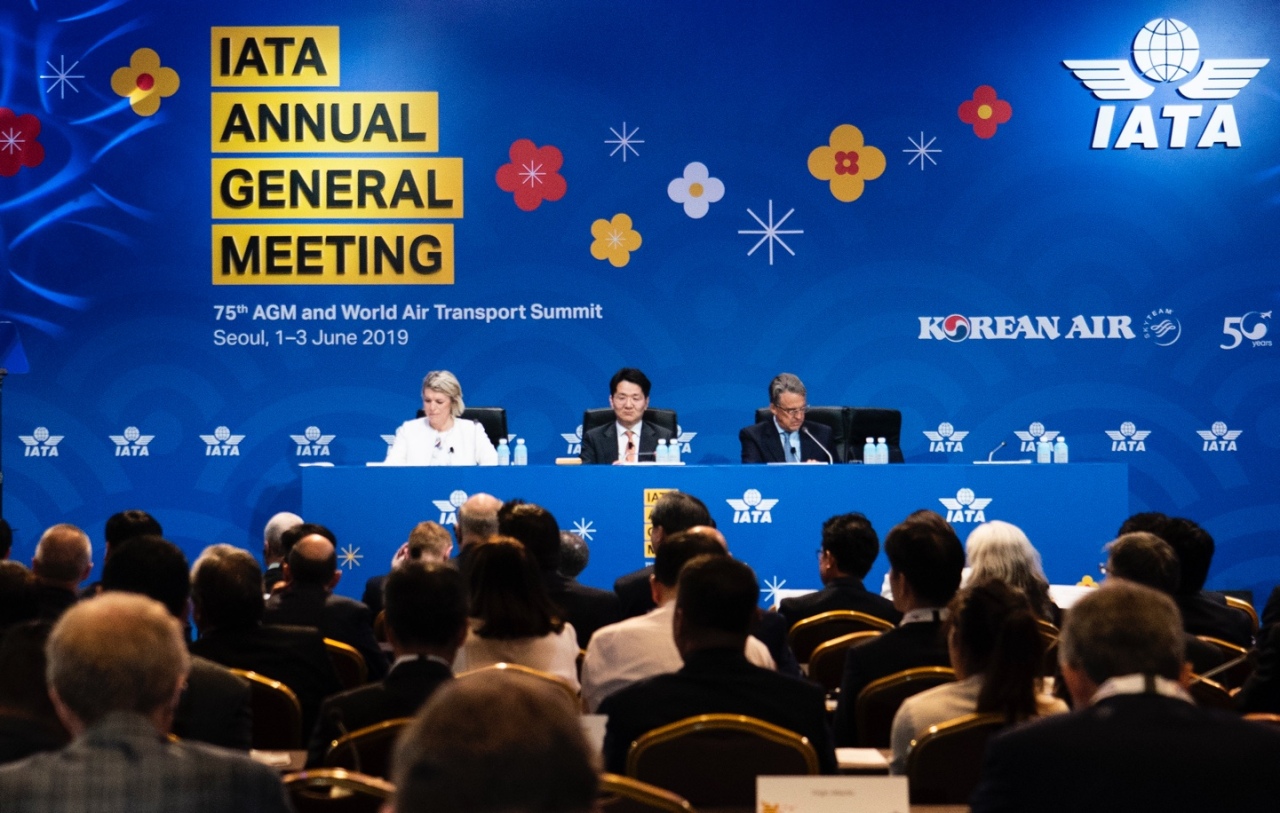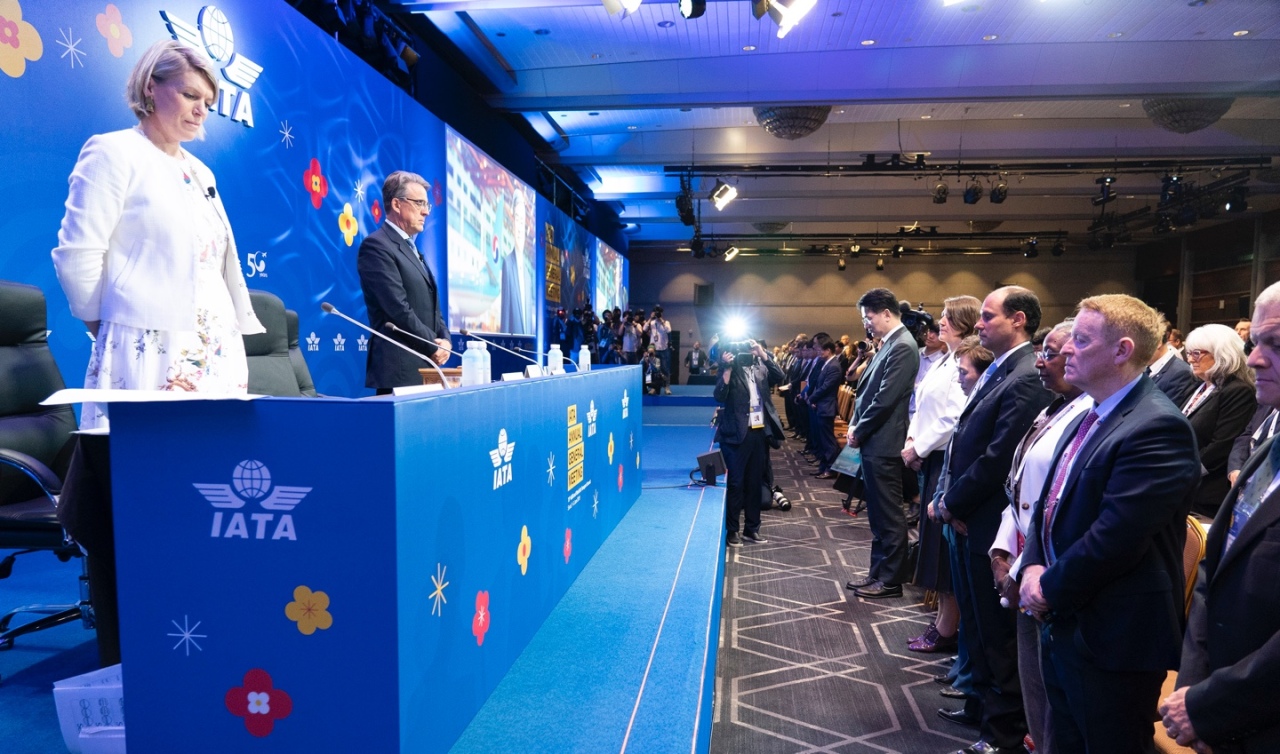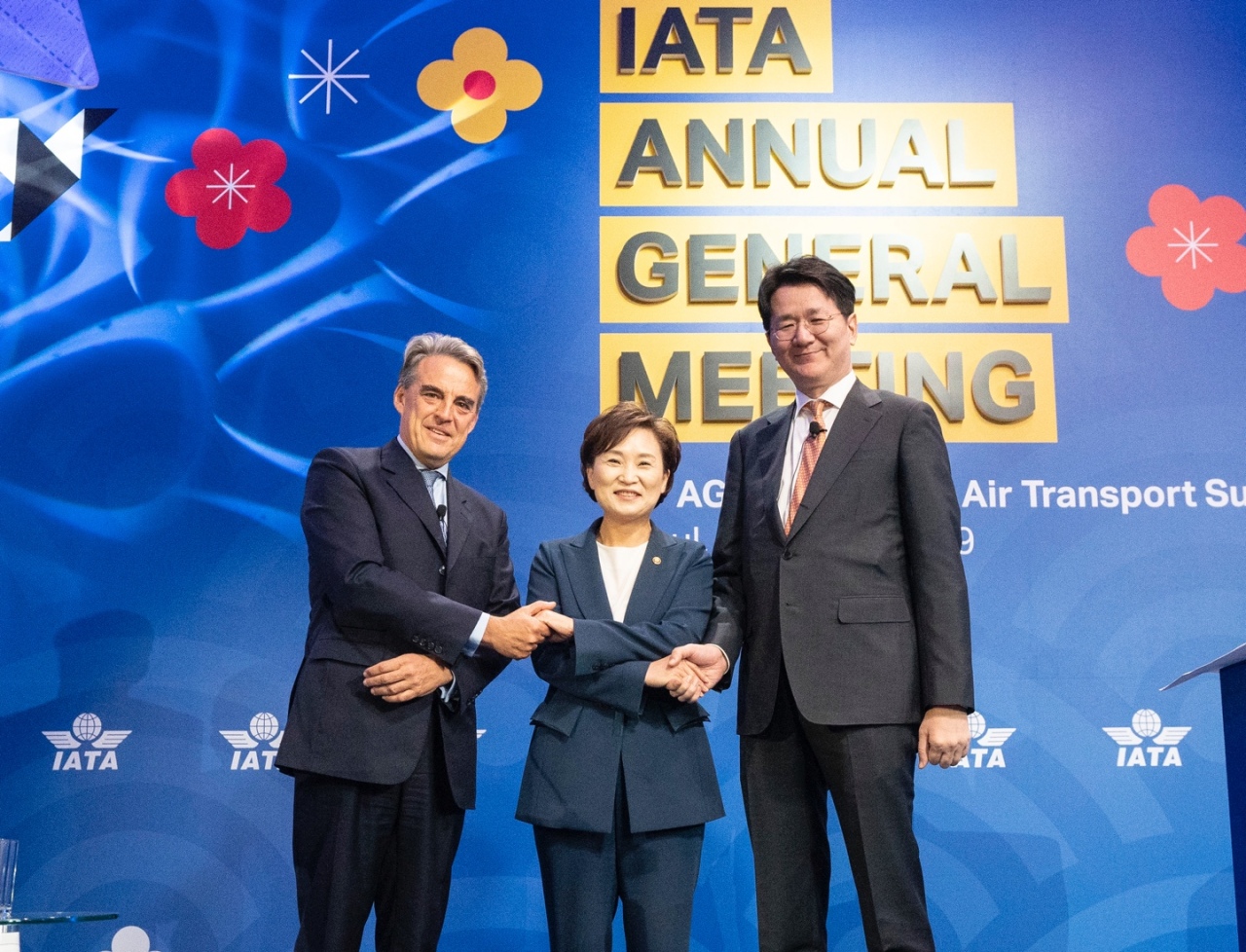An annual meeting of the world’s largest organization for air carriers kicked off Sunday for the first time in Seoul, bringing some 1,000 market leaders from 290 air carriers together to discuss the future of air transport under the theme “The Vision for the Future.”
Dubbed the aviation industry equivalent of a United Nations gathering, the two-day event surrounding the International Air Transport Association’s 75th annual general meeting will cover topics ranging from the digital transformation of airlines to infrastructure capacity, sustainability and building the workforce of the future, IATA said.
 |
International Air Transport Association Director-General and CEO Alexandre de Juniac (far right) and Korean Air CEO Cho Won-tae (center) lead the IATA’s 75th annual general meeting in Seoul on Sunday. (IATA) |
“Flying is freedom. And we can be proud that it is our business. Flying contributes to 15 of the 17 UN sustainable development goals,” said IATA Director General and CEO Alexandre de Juniac in his opening remarks.
Before officially kicking off the meeting, de Juniac requested a moment of silence for the late Korean Air Chairman Cho Yang-ho, who passed away in April from a lung ailment. Cho had initiated the process to have the meeting in Seoul and arranged for Korean Air to be the host.
The late chairman’s son, Cho Won-tae, or Walter Cho, who was appointed chairman and CEO of Korean Air in April after his father’s sudden death, led the 75th AGM on the elder Cho’s behalf.
 |
Attendees observe a moment of silence for the late Korean Air Chairman Cho Yang-ho during the International Air Transport Association’s 75th annual general meeting in Seoul on Sunday. Cho passed away in April from a lung ailment. (IATA) |
“We’re here to discuss our industry’s major issues and opportunities and it is my role as president to facilitate that dialogue and ensure a successful meeting. I’m honored to accept this responsibility,” said Cho.
“It was my father’s wish that this event be a meaningful review and celebration of our industry, and that is how this year’s AGM is planned. He would be very proud,” he added.
A day earlier, Cho Won-tae was elected as the first board chairman of the SkyTeam Alliance representing 19 member carriers. His tenure will end in 2021.
He was also appointed Sunday to IATA’s board of governors -- the organization’s decision-making body, which comprises only 32 members from the aviation industry, including the IATA director general. According to Korean Air, the late Chairman Cho Yang-ho served on IATA’s board of governors for eight consecutive years beginning in 1996.
In her welcoming remarks, South Korean Transport Minister Kim Hyun-mee said this year’s AGM would “be able to discover the vision for the future of the aviation industry and also share our extensive experiences between our countries and airlines, so that the whole aviation industry can make another leap forward.”
Violeta Bulc, the European Commissioner for Transport, said in her opening remarks that close cooperation between regulators and the industry could ensure a prosperous future for aviation by seeing to it that air carriers and other industry players maintained global standards and offered maximum safety for passengers.
 |
From left: International Air Transport Association Director-General and CEO Alexandre de Juniac; Minister of Land, Infrastructure and Transport Kim Hyun-mee; and Korean Air CEO Cho Won-tae pose for a photo during IATA’s 75th annual general meeting in Seoul on Sunday. (IATA) |
According to IATA’s annual report on the global air transport industry, announced during the AGM, the 2019 outlook for the industry needed to be downgraded to $28 billion in profit, as compared with $35.5 billion forecast in December last year.
Despite this year being the 10th consecutive year in the black for the airline industry, the IATA CEO said margins were being squeezed by the rising costs of labor, fuel and infrastructure, and that global trade was likely to continue to weaken as the US-China trade war intensified.
“This primarily impacts the cargo business, but passenger traffic could also be impacted as tensions rise. Airlines will still turn a profit this year, but there is no easy money to be made,” said de Juniac.
In terms of cost, IATA said the return on invested capital earned from airlines was expected to reach 7.4 percent this year, down from 7.9 percent in 2018, but would nevertheless still exceed the average cost of the capital (estimated at 7.3 percent).
IATA said after reaching a peak in 2017 at 9.7 percent growth, cargo demand slowed to 3.4 percent last year and this year was likely to see cargo volumes reach 63.1 million metric tons due to the impact of higher tariffs on trade.
“The good news is that airlines have broken the boom-and-bust cycle. But under current circumstances, the great achievement of the industry, creating value for investors with normal levels of profitability, is at risk. Airlines will still create value for investors in 2019 with above cost-of-capital returns, but only just,” said de Juniac.
During the AGM, the IATA member carriers agreed on five resolutions: implementation of a global carbon offsetting scheme; commitment to improving travel for passengers with disabilities; urging governments to adhere to global slot allocation guidelines; acceleration of the global implementation of the One ID, which uses individual biometric data to facilitate a paperless travel experience; and support for the global deployment of radio frequency identification for baggage tracking.
In terms of strengthening diversity in the industry, de Juniac said, “Women are not equally advancing into senior management. We are missing out on the insight and innovation that gender balance would bring. Our industry must engage the female half of the world’s population much more effectively.”
IATA also called for action from governments and regulators.
“They should build supportive politics to invigorate the sustainable fuels industry. But too many are focused on punitive environment taxes instead,” de Juniac said, stressing the ongoing public concerns about and industry interest in sustainable flying.
Meanwhile, airline CEOs voiced concern over the envisioned return to service of Boeing’s 737 Max, saying that restoring global trust should be the priority.
Boeing’s 737 Max was grounded globally in March after fatal accidents in Ethiopia and Indonesia that killed all passengers on board both flights. IATA has stressed that it plans to organize a summit for airlines, regulators and Boeing in five to seven weeks to discuss putting the model back into service.
“(The aviation) industry wants to learn and has to learn from the (latest) accident. It is all our job to continuously build public trust and regain their confidence,” said Carsten Spohr, CEO of Lufthansa Group, during a debate for airline CEOs that followed the AGM.
“Deliberate strategies between regulators and manufacturers working together will gain (public) trust as people now question the regulatory framework,” said Robin Hayes, CEO of Jet Blue.
Choon Phong Goh, CEO of Singapore Airlines, meanwhile, said, “In Singapore, we need more than that because unlike bigger countries like US and Canada (where) you can operate on domestic routes but all our operators are international. I would need approval from countries that we intend to operate the service. ... I don’t know how long (putting the 737 Max back into service would) take. It all depends on the regulators’ assessment.”
According to IATA, no exact time frame has yet been set for the re-entry into service.
By Kim Da-sol (
ddd@heraldcorp.com)








![[Herald Interview] 'Trump will use tariffs as first line of defense for American manufacturing'](http://res.heraldm.com/phpwas/restmb_idxmake.php?idx=644&simg=/content/image/2024/11/26/20241126050017_0.jpg)
![[Exclusive] Hyundai Mobis eyes closer ties with BYD](http://res.heraldm.com/phpwas/restmb_idxmake.php?idx=644&simg=/content/image/2024/11/25/20241125050044_0.jpg)
![[Herald Review] 'Gangnam B-Side' combines social realism with masterful suspense, performance](http://res.heraldm.com/phpwas/restmb_idxmake.php?idx=644&simg=/content/image/2024/11/25/20241125050072_0.jpg)